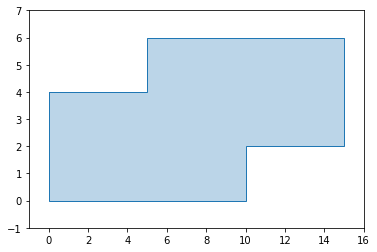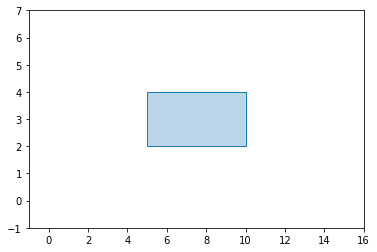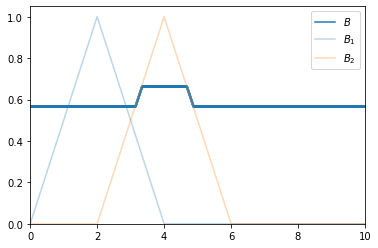Rules¶
- class floulib.Rules(*args)¶
Bases:
PlotThis class contains methods to define and use a set of rules.
- __init__(*args)¶
Constructor
- Parameters:
*args (Rule) – Arguments are instances of Rule.
- Raises:
TypeError – If arguments are not instances of Rule.
- Return type:
None.
Example
>>> from floulib import Term, Triangle, Rule, Rules, Variable >>> import numpy as np >>> A1 = Term('A1', Triangle(0, 5, 10, label = '$A_1$')) >>> A2 = Term('A2', Triangle(5, 10, 15, label = '$A_2$')) >>> B1 = Term('B1', Triangle(0, 2, 4, label = '$B_1$')) >>> B2 = Term('B2', Triangle(2, 4, 6, label = '$B_2$')) >>> v1 = Variable(np.linspace(0,15, 1000)) >>> v2 = Variable(np.linspace(0, 10, 1000)) >>> R = Rules( Rule().If(v1.Is(A1)).Then(v2.Is(B1)), Rule().If(v1.Is(A2)).Then(v2.Is(B2)) )
Support of the relation generated by the rules (conjunctive representation).
>>> R.plot(xlim = [-1, 16], ylim = [-1, 7])

Support of the relation generated by the rules (implicative representation).
>>> R.plot(xlim = [-1, 16], ylim = [-1, 7], implication = True)

- inference(*args, **kwargs)¶
Computes the image of a fuzzy subsets by a set of rules.
- Parameters:
*args (Variable) – Antecedents.
**kwargs (Operator) –
R: the implication operator. Default is
Operator.R_KD().T: the modus ponens triangular norm. Default is
Operator.T_Z().T1: the triangular norm to combine antecedents. Default is
Operator.T_Z().
- Returns:
The result.
- Return type:
Example
>>> from floulib import Term, Triangle, Rule, Rules, Variable >>> import numpy as np >>> A1 = Term('A1', Triangle(0, 5, 10, label = '$A_1$')) >>> A2 = Term('A2', Triangle(5, 10, 15, label = '$A_2$')) >>> B1 = Term('B1', Triangle(0, 2, 4, label = '$B_1$')) >>> B2 = Term('B2', Triangle(2, 4, 6, label = '$B_2$')) >>> v1 = Variable(np.linspace(0,15, 1000)) >>> v2 = Variable(np.linspace(0, 10, 1000)) >>> R = Rules( Rule().If(v1.Is(A1)).Then(v2.Is(B1)), Rule().If(v1.Is(A2)).Then(v2.Is(B2)) ) >>> A = Triangle(6, 8, 9) >>> B = R.inference(v1.Is(A)).label('$B$') >>> B.plot().add_plot(B1, alpha = 0.3).add_plot(B2, alpha = 0.3)

- sugeno_controller(*args)¶
Computes the output of a Sugeno controller.
- Parameters:
*args (Variable) – Arguments are instances of Variable.
- Raises:
Exception – If the length of If parts of the rules and number of arguments are not the same.
Exception – If the If parts of the rules are instances of Multilinear but do not have universes associated with.
TypeError – If the If part of the rules are not instances of Variable.
TypeError – Raised if the Then part of the rules is not instance of Variable.
- Returns:
The ouput of the Sugeno controller.
- Return type:
float
Example
>>> from floulib import Term, Triangle, Rule, Rules, Variable >>> import numpy as np >>> A1 = Term('A1', Triangle(0, 5, 10, label = '$A_1$')) >>> A2 = Term('A2', Triangle(5, 10, 15, label = '$A_2$')) >>> v1 = Variable(np.linspace(0,15, 1000)) >>> v2 = Variable(np.linspace(0, 50, 1000)) >>> R = Rules( Rule().If(v1.Is(A1)).Then(v2.Is(lambda x: x-3)), Rule().If(v1.Is(A2)).Then(v2.Is(lambda x: 3*x + 5)) ) >>> y = R.sugeno_controller(v1.Is(8)) >>> print(y) 19.4